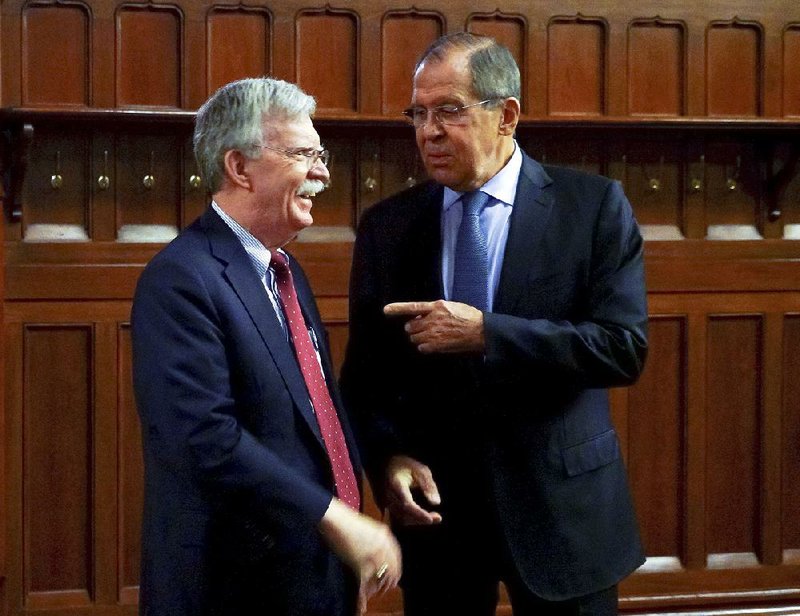MOSCOW -- President Donald Trump's national security adviser met in Moscow with top Russian officials Monday, less than 48 hours after Trump declared he intended to pull the United States out of a 1987 nuclear weapons treaty.
National security adviser John Bolton and his Russian counterpart, Security Council Chairman Nikolai Patrushev, discussed arms-control agreements, Syria, Iran, North Korea and the fight against terrorism, according to the Security Council.
During the talks, Patrushev emphasized the importance of maintaining the Intermediate-Range Nuclear Forces Treaty, the Security Council said in a statement carried by Russian news agencies.
Trump said Russia violated the treaty that prohibits the U.S. and Russia from possessing, producing or test-flying ground-launched nuclear cruise and ballistic missiles with a range of 300 to 3,400 miles.
He warned on Saturday that the U.S. will begin developing such weapons unless Russia and China agree not to possess or develop them. China wasn't a party to the pact that was signed in 1987 by President Ronald Reagan and Soviet leader Mikhail Gorbachev.
"Russia has not adhered to the agreement," Trump said Monday. "We have more money than anybody else by far, we'll build it up until they come to their senses."
"I'm terminating the agreement because they violated the agreement," Trump said, adding that his action was "a threat to whoever you want, and it includes China, and it includes Russia and it includes anybody else that wants to play that game."
Bolton noted in an interview with the Russian business daily Kommersant that the U.S. was concerned both with Russia's violation of the pact and China's intermediate-range missile capabilities. He also added that it would be unrealistic to expect Beijing to accept any limitations.
Without the restrictions of the 1987 treaty, China has had a free hand developing and deploying intermediate-range nuclear missiles of its own, including missiles designed to take out U.S. aircraft carriers patrolling the waters of the Western Pacific.
"China hasn't signed the agreement and has been producing mid-range missiles and so-called carrier killers to asymmetrically increase the costs of an American-led naval containment strategy," said Stephen Nagy, a senior associate professor at the International Christian University in Tokyo. "The U.S. is likely withdrawing to send a message to Beijing that the U.S. can and will produce mid-range nuclear weapons that can erode away China's existing asymmetric advantage."
China was among the nations Monday calling on the U.S. to reconsider pulling out of the treaty, saying the move would generate "multiple negative effects."
"I want to stress that it is completely wrong to use China as an excuse for pulling out of the treaty," Foreign Ministry spokesman Hua Chunying told reporters Monday in Beijing. "We hope relevant countries can cherish the hard-won achievements over the years, prudently and properly handle issues related to the treaty through dialogue and consultation, and think twice about withdrawing from the treaty."
The European Union also warned Trump to assess the potential impact of abandoning a 40-year-old arms control agreement.
In Monday's talks with Bolton, Patrushev reaffirmed Russia's "readiness for joint work to consider mutual complaints regarding the treaty's implementation," the Security Council said.
"It was underlined that its abrogation would deal a serious blow to the entire international system of nuclear non-proliferation and arms control," the council's statement said.
Patrushev and Bolton also discussed a possible five-year extension of another pivotal arms control agreement between Russia and the U.S. -- the New START Treaty that went into force in 2011 and is set to expire in 2021, the statement said.
Bolton also held talks later in the day with Russian Foreign Minister Sergey Lavrov and is set to meet with President Vladimir Putin today.
Putin's spokesman, Dmitry Peskov, warned on Monday that the U.S. withdrawal from the treaty would "make the world a more dangerous place."
He added that Russia would have to take countermeasures to "restore balance" if the U.S. opts out of the agreement.
Peskov reaffirmed Moscow's strong denial of any treaty violations.
"We categorically disagree with the claim that Russia has violated the INF Treaty," he said. "Russia has fully adhered to the treaty's provisions."
He noted that Russia has long voiced concern about what it sees as U.S. violations of the treaty. Russia has said U.S. missile defense facilities in Romania could be modified to house ground-to-ground intermediate-range cruise missiles.
Russia also voiced concern at the United Nations on Monday, saying the United States is increasing the role of nuclear weapons in its military planning as part of a stepped-up campaign by the Trump administration to ensure "U.S. military superiority over the rest of the world."
Andrei Belousov is deputy director of the Russian Foreign Ministry's Department of Nonproliferation and Arms Control. He told the U.N. General Assembly's disarmament committee that Russia is "especially concerned" at the Trump administration's Nuclear Posture Review, which provides for new U.S. nuclear weapons.
He said Russia has repeatedly called for "appropriate conditions" allowing "us to take practical measures to free the world from nuclear weapons."
U.N. Secretary-General Antonio Guterres "still hopes that the two countries will engage to solve the disagreements," U.N. deputy spokesman Farhan Haq said Monday.
Information for this article was contributed by Nataliya Vasilyeva, Vladimir Isachenkov, Deb Riechmann, Lorne Cook and Edith M. Lederer of The Associated Press; and by David Tweed and Dandan Li of Bloomberg News.
A Section on 10/23/2018
